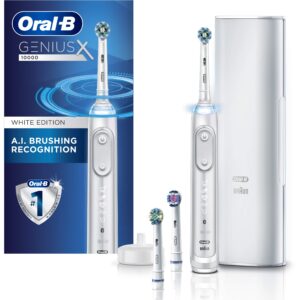GO ELECTRIC
September 16, 2024
Like many dental practices today, our office sends an email request for patients to leave comments about their visit to our office. Most comments are positive, for which we are grateful. However, all comments are helpful to the business to understand what patients are thinking. If one person is thinking it, most likely there are others.

Version 1.0.0
We received the following comment on our website from a patient who was in to see one of our hygienists:
“My hygienist is always very pleasant, conversational and professional in her services. However, I can do without the constant sales pitch to buy an electric toothbrush from your office. There is no evidence that an electric is any better than a good, manual 2-minute brush, and I don’t have any arthritis or dexterity issues.”
I really appreciate feedback from patients like this. Your own dental office would too. In my response to the patient, I explained that I didn’t like the fact that the patient had the feeling he was trying to be sold something. For the patient to feel that the only benefit was monetary to our office means the communication was inadequate. Most dental offices are not selling electric toothbrushes to make money.
We keep our preference of electric toothbrushes in stock for convenience and cost savings for the patient. The shared benefit for the dentist and the patient is improved health. We want our patients to have healthier gums and less cavities.
Back in the beginning of my professional career, I was an advocate of the manual toothbrush. I was convinced that anyone could get the same results with a manual toothbrush, compared with any electric/power toothbrush. It wasn’t until I actually tried a power toothbrush, and stuck with it, that I was convinced there was a distinct difference.
It is now common practice for us, and likely most dental practices, to ask patients if they use a manual toothbrush or an electric toothbrush. When we ask this question, we have also found that it is just as important to ask what kind of power toothbrush is used. One that sits in a charger is far more effective than one that you put batteries in, though it does cost more.
There have been numerous studies that have compared the effectiveness of both rotating and sonic power toothbrushes. In one study, 131 individuals were split into two groups – oscillating/rotating vs sonic power brushes. Prior to the study, 63% and 58% were manual toothbrush users, respectively. Each participant brushed twice daily during a four-week period using their assigned powered toothbrush and a standard toothpaste.
Researchers graded effectiveness of their plaque removal using a specific plaque-grading index. While both groups showed significant improvement when compared to manual brushing, the oscillating/rotating brush was better. 97% of the oscillating/rotating group saw a reduction in whole-mouth plaque, compared with 64% of the sonic participants.
“The current study demonstrated superior plaque reductions with an advanced oscillating/rotating power brush compared to a novel sonic brush, corroborating previous studies demonstrating the superiority of oscillating-rotating power brushes relative to sonic brushes,” the researchers concluded.
While using a manual toothbrush can be effective, it is clear based on this study and others, that a good quality power toothbrush is better. It’s time to change if you still use a manual brush.
You can do what you want with a car, but when it comes to a toothbrush, electric wins…hands-down!
Dr. St. Clair maintains a private dental practice in Rowley dedicated to health-centered family dentistry. He has a special interest in treating snoring, sleep apnea and TMJ problems. If there are certain topics you would like to see written about or questions you have please email them to him at jpstclair@stclairdmd.com
No Comments
No comments yet.
RSS feed for comments on this post.
Sorry, the comment form is closed at this time.







